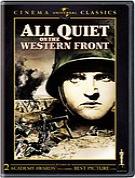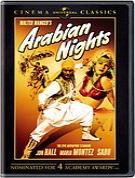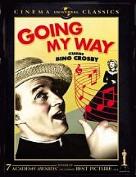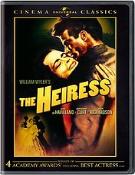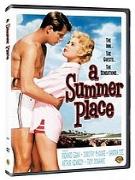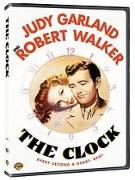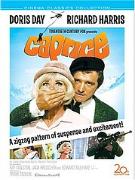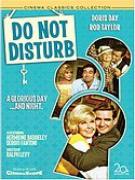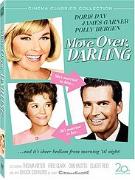
Knight at HOME at the Movies
Classics Roundup (Winter 2007)
Get ready to travel all the way from 1930 to 1967 in this wide ranging classics roundup.
Get ready to travel all the way from 1930 to 1967 in this wide ranging classics roundup.
Universal Studios has introduced a new, very welcome series for fans of classic cinema. This is their Cinema Classics
Series, which kicks off with four winning titles including two new titles to DVD. Though the discs don’t include much in the
way of Special Features (only an informative though brief introduction by TCM’s Robert Osborne and the film trailer) all the
films have been remastered and the difference between previous DVD editions is striking.
This is immediately apparent with 1930’s All Quiet on the Western Front, director Lewis Milestone’s anti-war epic.
The movie, which follows the story of several young friends falling for war fever propaganda spewed by their zealous
college professor and enlisting in WW I is still pertinent and has never looked or sounded better than in this newly
restored release (struck by an archival print at the Library of Congress). Handsome Lew Ayres stars as the most gung ho
of his pals and the one who suffers the most in the ensuing wake up call each of the young soldiers receives when faced
with death and mutilation in the trenches. Though dated in some aspects, the movie, given its universal theme, is still
pertinent. And Milestone offers moments of humor and charm (especially the sequence where the four horny soldiers
swim nude across a river for a little after hours recreation with some saucy French girls). Ayres went on to play Katharine
Hepburn’s brother in 1938’s Holiday, piano playing Ned who’s forced to give up his music in favor of business. I’ve always
suspected that Ayres’ Ned, who is single, was forced by family pressure, to give up certain other inclinations.
But I digress…
Next on the list of Universal Cinema Classics is the deliriously fun Arabian Nights from 1942. Inspired wholeheartedly
by Korda’s sumptuous Thief of Bagdad, this was Universal’s first Technicolor picture. The movie stars the deadly serious
diva Maria Montez whose lack of humor only adds to the film’s camp value. When she’s not bitching out her maid or
complaining to Sabu (who served the same function in Bagdad and many other cinematic outings), Montez is over
emoting, dancing up a storm as Sherazade and cozying up to Jon Hall, her deep dish of a leading man (who was
memorable in The Hurricane), she’s standing around looking, well, fabu-lush! There’s a lot of typical action and intrigue in
this highly entertaining and delightfully artificial studio product and this is nothing if not the perfect fodder for a Sunday
matinee. So successful was the film, Montez and Hall were reunited for another – and hopefully we’ll get a release down
the road from Universal.
There have been multiple editions of Bing Crosby’s 1944 Going My Way, Crosby’s Best Picture Oscar winning classic of
a “modern” priest bringing frivolity and common sense (and several songs) in an attempt to shake up an inner city
congregation. But again, Universal’s given this mawkish yet deeply entertaining film a wondrous new life with this restored
print. This is one of those movies that seems to defy criticism and even for those not inclined to delight in its mixture of
gentle comedy and sentimentality, there’s still Der Bingle crooning the Oscar Winning “Swinging On A Star” and others.
Expertly guided by director Leo McCarey (he went on to do An Affair to Remember a decade later), Crosby is indeed
winning. Another staple of Sunday TV matinee with good reason – this is, indeed, a family classic.
The fourth (and most anticipated) title of the new Universal Cinema Classics line is director William Wyler’s superb 1949
adaptation of Henry James’ “Washington Square,” The Heiress. Wyler’s film was adapted for the screen from the hit
play and won a second Oscar for its leading lady, Olivia De Havilland. Playing the mousy, old maid daughter of a wealthy
surgeon, an exacting, fussy and horribly pretentious widower (Ralph Richardson in his greatest screen part), De Havilland
shines with her performance as the desperate to please Catherine who learns the truth about love and life too late. Urged
on by her nosy, pleasure loving Aunt (Miriam Hopkins, also note perfect), the spinster is courted by the impossibly
handsome Morris Townsend (Montgomery Clift) who seems to be nothing more than a fortune hunter after Catherine’s
riches.
This tale of love and unrequited love is told mainly within the closed door environment of the lavish Sloper residence. The
intimate story is further exacerbated by Wyler’s deep focus black and white photography and an Oscar winning score by
Aaron Copland (though he was furious about Wyler’s adding the love theme that Morris’ composes to help in his seduction
of Catherine to the score). The theme is pretty enough (and later morphed into a hit song for Elvis Presley) but its pale
stuff next to the master’s score. Sadly, a complete soundtrack has never been released.
But here at last we have the enduring pleasures of Wyler’s film to enjoy – and his famous ability to direct actors. De
Havilland rightfully won the Oscar, Richardson is stunning, Hopkins doesn’t overdue it (thank you Wily) and Clift, though a
tad “modern” in his approach, nevertheless, is otherwise the right choice for the part. Wyler also cast a small but expert
group of supporting players that augment the piece. Highest recommendation.
Series, which kicks off with four winning titles including two new titles to DVD. Though the discs don’t include much in the
way of Special Features (only an informative though brief introduction by TCM’s Robert Osborne and the film trailer) all the
films have been remastered and the difference between previous DVD editions is striking.
This is immediately apparent with 1930’s All Quiet on the Western Front, director Lewis Milestone’s anti-war epic.
The movie, which follows the story of several young friends falling for war fever propaganda spewed by their zealous
college professor and enlisting in WW I is still pertinent and has never looked or sounded better than in this newly
restored release (struck by an archival print at the Library of Congress). Handsome Lew Ayres stars as the most gung ho
of his pals and the one who suffers the most in the ensuing wake up call each of the young soldiers receives when faced
with death and mutilation in the trenches. Though dated in some aspects, the movie, given its universal theme, is still
pertinent. And Milestone offers moments of humor and charm (especially the sequence where the four horny soldiers
swim nude across a river for a little after hours recreation with some saucy French girls). Ayres went on to play Katharine
Hepburn’s brother in 1938’s Holiday, piano playing Ned who’s forced to give up his music in favor of business. I’ve always
suspected that Ayres’ Ned, who is single, was forced by family pressure, to give up certain other inclinations.
But I digress…
Next on the list of Universal Cinema Classics is the deliriously fun Arabian Nights from 1942. Inspired wholeheartedly
by Korda’s sumptuous Thief of Bagdad, this was Universal’s first Technicolor picture. The movie stars the deadly serious
diva Maria Montez whose lack of humor only adds to the film’s camp value. When she’s not bitching out her maid or
complaining to Sabu (who served the same function in Bagdad and many other cinematic outings), Montez is over
emoting, dancing up a storm as Sherazade and cozying up to Jon Hall, her deep dish of a leading man (who was
memorable in The Hurricane), she’s standing around looking, well, fabu-lush! There’s a lot of typical action and intrigue in
this highly entertaining and delightfully artificial studio product and this is nothing if not the perfect fodder for a Sunday
matinee. So successful was the film, Montez and Hall were reunited for another – and hopefully we’ll get a release down
the road from Universal.
There have been multiple editions of Bing Crosby’s 1944 Going My Way, Crosby’s Best Picture Oscar winning classic of
a “modern” priest bringing frivolity and common sense (and several songs) in an attempt to shake up an inner city
congregation. But again, Universal’s given this mawkish yet deeply entertaining film a wondrous new life with this restored
print. This is one of those movies that seems to defy criticism and even for those not inclined to delight in its mixture of
gentle comedy and sentimentality, there’s still Der Bingle crooning the Oscar Winning “Swinging On A Star” and others.
Expertly guided by director Leo McCarey (he went on to do An Affair to Remember a decade later), Crosby is indeed
winning. Another staple of Sunday TV matinee with good reason – this is, indeed, a family classic.
The fourth (and most anticipated) title of the new Universal Cinema Classics line is director William Wyler’s superb 1949
adaptation of Henry James’ “Washington Square,” The Heiress. Wyler’s film was adapted for the screen from the hit
play and won a second Oscar for its leading lady, Olivia De Havilland. Playing the mousy, old maid daughter of a wealthy
surgeon, an exacting, fussy and horribly pretentious widower (Ralph Richardson in his greatest screen part), De Havilland
shines with her performance as the desperate to please Catherine who learns the truth about love and life too late. Urged
on by her nosy, pleasure loving Aunt (Miriam Hopkins, also note perfect), the spinster is courted by the impossibly
handsome Morris Townsend (Montgomery Clift) who seems to be nothing more than a fortune hunter after Catherine’s
riches.
This tale of love and unrequited love is told mainly within the closed door environment of the lavish Sloper residence. The
intimate story is further exacerbated by Wyler’s deep focus black and white photography and an Oscar winning score by
Aaron Copland (though he was furious about Wyler’s adding the love theme that Morris’ composes to help in his seduction
of Catherine to the score). The theme is pretty enough (and later morphed into a hit song for Elvis Presley) but its pale
stuff next to the master’s score. Sadly, a complete soundtrack has never been released.
But here at last we have the enduring pleasures of Wyler’s film to enjoy – and his famous ability to direct actors. De
Havilland rightfully won the Oscar, Richardson is stunning, Hopkins doesn’t overdue it (thank you Wily) and Clift, though a
tad “modern” in his approach, nevertheless, is otherwise the right choice for the part. Wyler also cast a small but expert
group of supporting players that augment the piece. Highest recommendation.
Next up are two fun, new releases from Warner Home Video. The first is Vincente Minnelli’s charming 1945 “little picture,”
The Clock. “Little” because the movie’s intimate story revolves around the quick courtship and marriage of soldier
Robert Walker, Jr. and office worker Judy Garland and because this was Garland’s only non-singing role during her glorious
tenure as MGM’s queen of the musical.
But Garland shines, as does Walker, in this delightful, gentle comedy in which New York city becomes a third,
overwhelming character. For once the pair decide to marry they must do so before Walker’s leave expires and he must
ship out. The cold hearted city, perfectly recreated on MGM’s sound stages (down to Grand Central Station – now that’s
real dream factory stuff), seems to thwart the lovers at every turn. And overhanging the story, of course, is the
uncertainty of the outcome of our lovers’ story. Garland, who is lovely to look at, is tender and warm and funny (one
doesn’t mind her not singing) and Walker, who was going through a messy divorce with Jennifer Jones at the time, is her
perfect awkward, and very cute foil. Minnelli expertly guides this simple story and his actors (the movie is also stuffed
with MGM’s usual roster of knowing supporting players) to a memorable conclusion. A wonderful addition to the Garland
DVD library.
Also out from Warner is 1959’s A Summer Place. This high blown soap opera, the “frank” retelling of the popular
novel by Sloan “The Man in the Gray Flannel Suit” Wilson, is supremely silly and supremely irresistible. Very much in the
Douglas Sirk mold, this is the story of two romances – new and old – coming together (sort of) during a summer vacation
at a Maine resort. The first pair are the cloying teenaged Troy Donahue (in his screen introduction) and Sandra Dee and
the other pair are his mother (Dorothy McGuire) and her father (Richard Egan) – reuniting for the first time since their
teenage fling of illicit passion. It’s the other two parents – the frigid, sex obsessed, shrewish mother of Dee (Constance
Ford) and the snobbish, drunken father of Donahue (the cravat wearing, Bourbon swilling Arthur Kennedy) that really set
the hokum into high gear. At one point Ford, aware of the growing attraction and “naughty” midnight swims between her
daughter and the big haired Donahue has her examined by a Doctor to ascertain if her virginity is still intact! All this
enjoyable camp – and much more – is bathed in the movie’s lush score by Max Steiner highlighted by the all too familiar
theme that was a huge instrumental hit. The Clock includes the trailer, the Lux Radio audio version of the story with
Garland joined at the microphone by John Hodiak (her co-star in The Harvey Girls) and other vintage features (to give one
the full on 1945 movie palace experience). A Summer Place has just the trailer. Both are great, popular entertainments.
So are – for Doris Day and romantic comedy fans – three new to DVD comedies from 20th Century Fox featuring the
singer/actress/comedienne often dubbed “The Professional Virgin” for her run as the Queen of Niceness throughout the
1960s. The first (and most satisfying) is 1963’s Move Over Darling, the remake of the Cary Grant-Irene Dunne-
Randolph Scott comedy My Favorite Wife. Day co-stars with James Garner, Polly Bergen, hunky Chuck Connors and the
always welcome Thelma Ritter in the story of a woman shipwrecked on a desert island who returns to find her husband
remarried. Day, stepping into the role after the studio shut down an attempt at a remake the year before with Marilyn
Monroe (called Something’s Got To Give) gives her usual sunny, expert performance. Garner is suitably handsome and
exasperated as the man in the middle (though he doesn’t have Grant’s finesse) and Bergen holds her own. The result is
a bit farfetched but pleasant enough and certainly, based on the existing evidence, Day is a much better choice for the
role.
Day’s popularity was wearing a tad by the time of 1965’s Do Not Disturb. But teamed with Rod Taylor and set in
“exotic” London (though the picture was shot on Fox’s back lot), Day does plenty with the thin story of a woman so jealous
of her husband’s devotion of business that she invents a lover to make him jealous. Naturally, a flesh and blood rival
shows up (in the person of one Sergio Fantoni). Day is also advised by the welcome Hermione Baddeley (familiar to
audiences later as Bea Arthur’s saucy maid on “Maude,” Mrs. Tuckahoe) and dressed in fun “England Swings” fashions by
Ray Aghayan. Both he and Taylor would be back for Day’s next picture later that year, The Glass Bottom Boat – and
Aghayan would stay on to help give 1967’s Caprice, the third in Fox’s new releases (it's first home viewing release), the
proper pop art fashion look. In this comedy-spoof of business espionage, Day is teamed up with sexy Richard Harris.
She plays an espionage spy for hire who is trying to ferret out the secret cosmetic formulas of scientist Ray Walston.
Though Day wasn’t thrilled with the ensuing spoof (one of dozens made around the same time), the result has its share
of amiable laughs, those eye popping fashions, and the required “groovy” sixties spy feel and look. Of the three discs,
each which feature title songs sung by Day, this one is my favorite. Each of the Day discs has newly created and vintage
behind the scenes featurettes that are a real bonus – including extremely rare audio radio interviews with Day.
The Clock. “Little” because the movie’s intimate story revolves around the quick courtship and marriage of soldier
Robert Walker, Jr. and office worker Judy Garland and because this was Garland’s only non-singing role during her glorious
tenure as MGM’s queen of the musical.
But Garland shines, as does Walker, in this delightful, gentle comedy in which New York city becomes a third,
overwhelming character. For once the pair decide to marry they must do so before Walker’s leave expires and he must
ship out. The cold hearted city, perfectly recreated on MGM’s sound stages (down to Grand Central Station – now that’s
real dream factory stuff), seems to thwart the lovers at every turn. And overhanging the story, of course, is the
uncertainty of the outcome of our lovers’ story. Garland, who is lovely to look at, is tender and warm and funny (one
doesn’t mind her not singing) and Walker, who was going through a messy divorce with Jennifer Jones at the time, is her
perfect awkward, and very cute foil. Minnelli expertly guides this simple story and his actors (the movie is also stuffed
with MGM’s usual roster of knowing supporting players) to a memorable conclusion. A wonderful addition to the Garland
DVD library.
Also out from Warner is 1959’s A Summer Place. This high blown soap opera, the “frank” retelling of the popular
novel by Sloan “The Man in the Gray Flannel Suit” Wilson, is supremely silly and supremely irresistible. Very much in the
Douglas Sirk mold, this is the story of two romances – new and old – coming together (sort of) during a summer vacation
at a Maine resort. The first pair are the cloying teenaged Troy Donahue (in his screen introduction) and Sandra Dee and
the other pair are his mother (Dorothy McGuire) and her father (Richard Egan) – reuniting for the first time since their
teenage fling of illicit passion. It’s the other two parents – the frigid, sex obsessed, shrewish mother of Dee (Constance
Ford) and the snobbish, drunken father of Donahue (the cravat wearing, Bourbon swilling Arthur Kennedy) that really set
the hokum into high gear. At one point Ford, aware of the growing attraction and “naughty” midnight swims between her
daughter and the big haired Donahue has her examined by a Doctor to ascertain if her virginity is still intact! All this
enjoyable camp – and much more – is bathed in the movie’s lush score by Max Steiner highlighted by the all too familiar
theme that was a huge instrumental hit. The Clock includes the trailer, the Lux Radio audio version of the story with
Garland joined at the microphone by John Hodiak (her co-star in The Harvey Girls) and other vintage features (to give one
the full on 1945 movie palace experience). A Summer Place has just the trailer. Both are great, popular entertainments.
So are – for Doris Day and romantic comedy fans – three new to DVD comedies from 20th Century Fox featuring the
singer/actress/comedienne often dubbed “The Professional Virgin” for her run as the Queen of Niceness throughout the
1960s. The first (and most satisfying) is 1963’s Move Over Darling, the remake of the Cary Grant-Irene Dunne-
Randolph Scott comedy My Favorite Wife. Day co-stars with James Garner, Polly Bergen, hunky Chuck Connors and the
always welcome Thelma Ritter in the story of a woman shipwrecked on a desert island who returns to find her husband
remarried. Day, stepping into the role after the studio shut down an attempt at a remake the year before with Marilyn
Monroe (called Something’s Got To Give) gives her usual sunny, expert performance. Garner is suitably handsome and
exasperated as the man in the middle (though he doesn’t have Grant’s finesse) and Bergen holds her own. The result is
a bit farfetched but pleasant enough and certainly, based on the existing evidence, Day is a much better choice for the
role.
Day’s popularity was wearing a tad by the time of 1965’s Do Not Disturb. But teamed with Rod Taylor and set in
“exotic” London (though the picture was shot on Fox’s back lot), Day does plenty with the thin story of a woman so jealous
of her husband’s devotion of business that she invents a lover to make him jealous. Naturally, a flesh and blood rival
shows up (in the person of one Sergio Fantoni). Day is also advised by the welcome Hermione Baddeley (familiar to
audiences later as Bea Arthur’s saucy maid on “Maude,” Mrs. Tuckahoe) and dressed in fun “England Swings” fashions by
Ray Aghayan. Both he and Taylor would be back for Day’s next picture later that year, The Glass Bottom Boat – and
Aghayan would stay on to help give 1967’s Caprice, the third in Fox’s new releases (it's first home viewing release), the
proper pop art fashion look. In this comedy-spoof of business espionage, Day is teamed up with sexy Richard Harris.
She plays an espionage spy for hire who is trying to ferret out the secret cosmetic formulas of scientist Ray Walston.
Though Day wasn’t thrilled with the ensuing spoof (one of dozens made around the same time), the result has its share
of amiable laughs, those eye popping fashions, and the required “groovy” sixties spy feel and look. Of the three discs,
each which feature title songs sung by Day, this one is my favorite. Each of the Day discs has newly created and vintage
behind the scenes featurettes that are a real bonus – including extremely rare audio radio interviews with Day.
